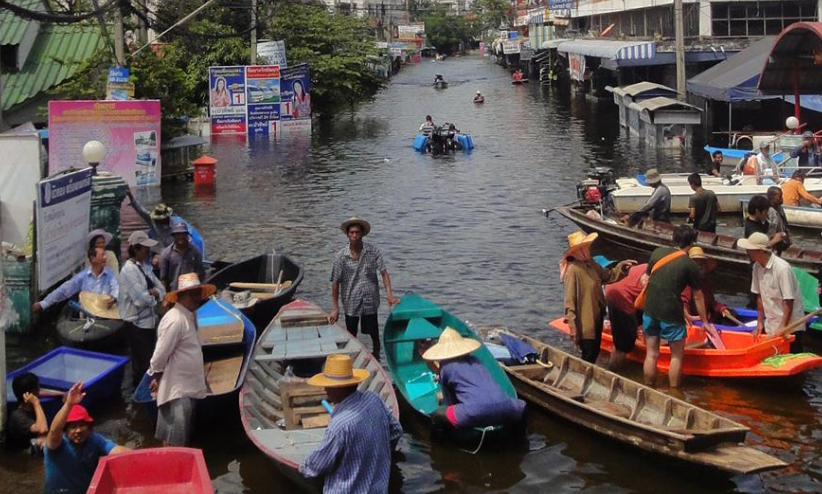Case-study /
Climate Change Research Strategy for Thailand

Introduction
Major flooding occurred in Thailand in 2011 affecting central provinces and Bangkok. The effects of climate change are likely to bring similar devastation and disruption to Thailand in the future. It is anticipated that flooding on this scale is likely to reoccur, which will bring considerable challenges for key development sectors, such as tourism, industry, and agriculture. Coastal areas, watersheds, and other ecosystems essential to the well-being of Thai people are likely to be greatly affected.
Thailand can and will adapt to these changes. However, great uncertainty exists over exactly how, when and where Thailand will be affected, and the options which may be available to achieve both climate resilience and low carbon development. This uncertainty must be addressed on a number of fronts. A coordinated, participatory, and closely monitored climate change research strategy can help generate knowledge for use by national decision makers – and Thai citizens. This will help to achieve better climate change planning and support effective program design and implementation.
The Office of Natural Resources and Environmental Policy and Planning (ONEP), together with the National Research Council of Thailand (NRCT) and the Royal Institute (RI), requested assistance from USAID Adapt Asia-Pacific to formulate a strategic plan that would identify, support, monitor and assess a national strategy for climate change research in Thailand.
This briefing note describes the challenge faced and how ADAPT Asia-Pacific approached it. Read about the development of a National Climate Change Research Strategy for Thailand here.
Approach and Outputs
The Climate Change Research Strategy for Thailand was prepared through the review of past and existing research on climate change and related fields, both in Thailand and internationally. The strategy included an extensive program of consultations with both researchers and knowledge users. This ensured a clear relationship between the need for new understanding and the climate change research that is commissioned in the future.
ADAPT Asia-Pacific aimed to produce a strategy that is coherent and accessible, and that identifies priorities for future climate change research. It aimed to be comprehensive in scope, covering both mitigation and adaptation, but with an emphasis on adaptation because this is the area where the need for new knowledge and policy direction is greatest in Thailand. It aimed to cover research funded by the Government of Thailand and research resourced through other means, and to pay attention to the potential of regional and international collaboration on climate change research.
A program structure was proposed, with self-contained research programs (groups of projects clustered around a common theme). This structure was proposed because it allowed individual programs can have their own budgets, timeframes and internal synergies. Such a structure allows the various programs to be administered by different organizations and have their own governance structure and expert review process. Individual programs can also be aligned with broader research processes in fields such as agricultural research and with policy processes. This would ensure a far more effective use of research results and policy relevance.
The project also explored the scope for establishing a Centre for Climate Change Research with a mandate that could cover some or all of the following issues: (i) research monitoring and evaluation; (ii) ) communications and raising public awareness through syntheses of climate change research; (iii) capacity-building in the Thai research community.
Funded through USAID’s Regional Development Mission for Asia (USAID/RDMA) and implemented by AECOM, USAID Adapt Asia-Pacific was designed to share information and best practices about climate change adaptation finance modalities and project preparation tools and help governments build capacity to access the existing pool of international climate change adaptation funds.
Go to the USAID Climate Change Adaptation Project Preparation Facility for Asia and the Pacific (USAID Adapt Asia-Pacific) project page
Suggested Citation
USAID Adapt Asia-Pacific (2013) Climate Change Research Strategy for Thailand.Program Brochure. USAID Regional Development Mission for Asia: Bangkok, Thailand.
